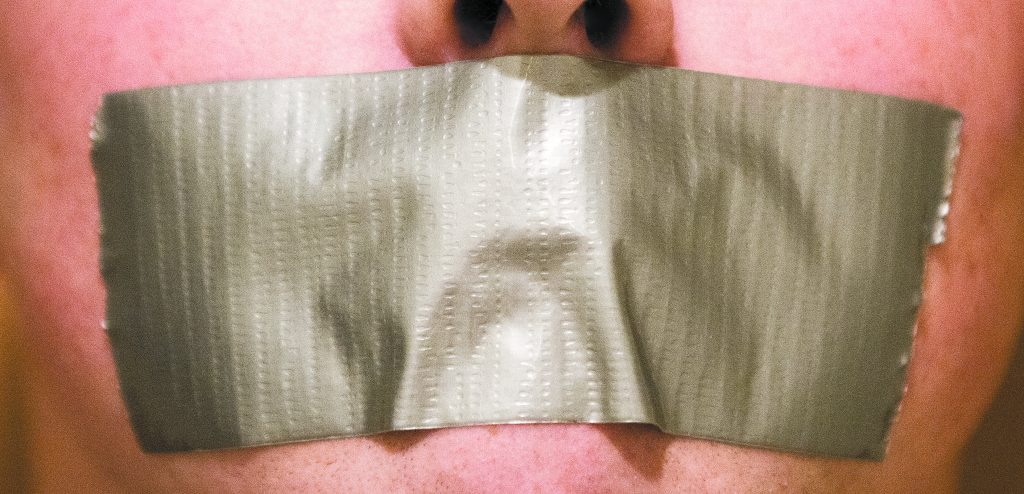Rewriting the First Amendment
By Russ Davis
Last month, the University of North Carolina gave us a lesson in Political Correctness 101.
UNC’s Student Finance Committee recently rejected the College Republicans’ proposed budget, reducing it by 75 percent over the previous year. To the Finance Committee, the biggest sticking point in the College Republicans’ proposal was that they wanted to use the money, at least in part, to finance speaking visits by two conservative personalities: Katie Pavlich, news editor of TownHall.com; and Irish filmmaker Ann McElhinney, director of the pro-fracking documentary FrackNation. I can’t profess to know firsthand what went on behind closed doors at the meeting, but the best reports speculate that, during the meeting, members of the finance committee went so far as to say that the speakers offered “no value.”
Surely this is nothing, right? Not according to UNC Wilmington professor Mike Adams, who, in a guest column for TownHall.com, explained what Pavlich could do to get the necessary funding to speak at a UNC campus: Instead of advocating guns for self-defense, “[t]ell them the guns can… be used as sex toys.”
Adams’s story is satire, but his point can’t be ignored. After all, the UNC Student Finance Committee did not reduce funding for various feminist and anarchist groups for this academic year. And Adams himself points out how, among other things, UNC Wilmington paid $12,500 to have an address on environmentalism given by left-wing journalist Arianna Huffington (who, it should be noted, arrived in North Carolina via private jet).
McElhinney and Pavlich’s respective colleagues will tell you why the request was rejected: because their views are ‘wrong’ on the campuses of your typical American university. I can’t say I disagree. One of Pavlich’s main topics is gun rights (she’s in favor, by the way); I became a fan of hers after reading her book Fast and Furious which details the Obama Administration’s anti-gun policies. As for McElhinney, her films largely deal with challenging the agenda of environmentalist lobbyists. I can’t speak for the whole country, but I have no problem saying that these women would likely face heavy protest if they spoke on a University of Washington campus.
Of course, protest is not a bad thing. Indeed, it’s good that people feel they can voice their opinion. But that includes acknowledging the right of others to voice their opinion. UNC demonstrated that this didn’t matter to their administration; otherwise, Arianna Huffington and Katie Pavlich would have been given equal consideration (especially given that Pavlich requested one-fourth of what Huffington ultimately received).
Unfortunately, too often, only one side of protest is permitted. Sure, our government at least has limits on speech restriction, but that’s not true in other countries. Sometimes, I have to shake my head when I consider the limits on speech imposed by government authorities:
- France’s supreme court has ruled that advocating a boycott of Israel qualifies as punishable discrimination
- Radio stations in Canada must air a certain percentage of music by Canadian artists; those who don’t face fines and loss of their broadcasting license
- Stories about time travel are prohibited in China (but Back to the Future is one of my favorite movies!)
- The 2005 British-American film The Interpreter was prohibited from screening in Zimbabwe, as the movie was thought to be a thinly-veiled critique of Zimbabwean dictator Robert Mugabe
- In 2011, the Turkish government banned access to the website 4chan.org
This is just a surface scratch of some of the restrictions on free speech that exist in this world. Some restrictions are your typical Alien-and-Sedition-style “no criticism of the government” bans. Some are outright absurd. I’m not suggesting that anyone can say just anything. The Supreme Court has said that free speech should be limited when it presents a clear and present danger. I can understand that. But let’s not let our society reach a point where preventing a clear and present danger means limiting access to 4chan.
And as for our universities, that means allowing all different viewpoints to be heard. Free speech does not mean “Free speech for do-as-I-say environmentalists, but not for gun rights supporters.”



